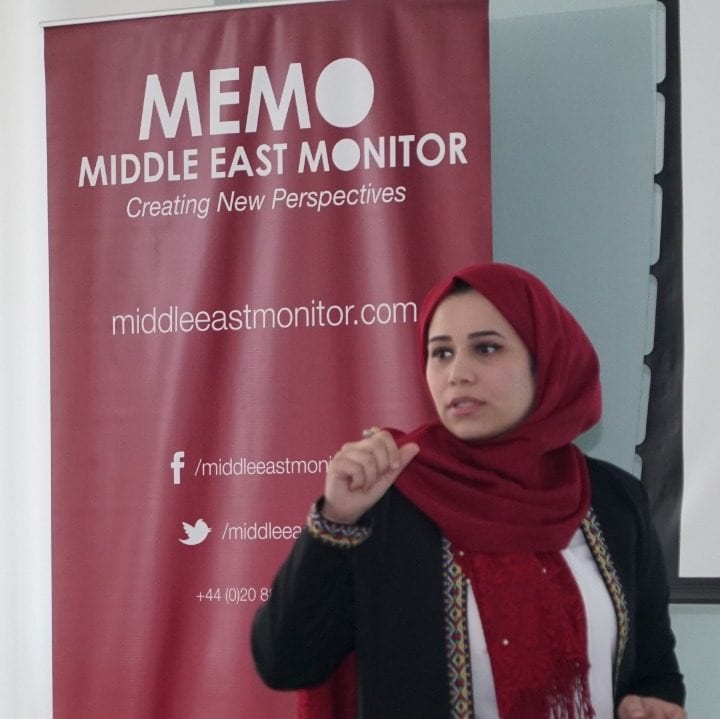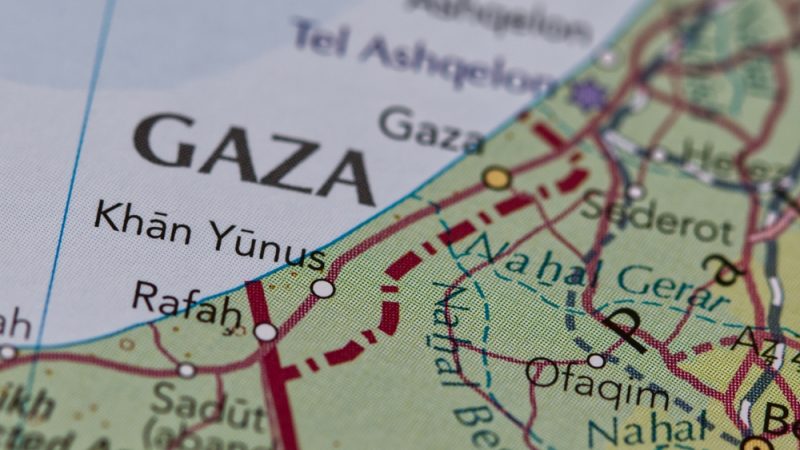MEMO
November 17, 2024

The Netherlands’ deputy Finance Minister Nora Achahbar speaks during a press conference, on November 15, 2024 in The Hague
The Netherlands’ government and its coalition has survived despite a minister’s resignation over alleged racist comments made by officials following clashes in Amsterdam between Israeli football fans and pro-Palestinian locals.
On Friday this week, Dutch Junior Finance Minister Nora Achahbar resigned from the country’s cabinet in an unexpected move, protesting against some of her colleagues’ alleged claims that Dutch youth of Moroccan descent had attacked Israeli fans last week after a football match between Dutch team Ajax and Israeli team Maccabi Tel Aviv.
The reported comments by members of the Netherlands’ mostly far-right coalition government are in contradiction to extensive eyewitness and video evidence showing the Israeli fans aggravating the situation by first chanting anti-Arab and anti-Palestinian slogans while pulling down Palestinian flags, vandalising property, and assaulting those who attempted to prevent them.
READ: Dutch security units dismayed by Israeli influence on national politics
In her resignation letter to parliament, Achahbar – a Morocco-born former judge and public prosecutor – stated that the “polarising interactions of the past weeks made such an impact on me that I am no longer able to effectively carry out my duties as deputy minister”.
Her move had initially triggered an emergency meeting in which other cabinet members of her centrist New Social Contract (NSC) party also threatened to quit, igniting fears that the country’s four-party governing coalition would break down and lose its majority in parliament, which would have caused the government to collapse.
At a news conference at The Hague the same evening, however, Dutch prime minister Dick Schoof announced that “We have reached the conclusion that we want to remain, as a cabinet for all people in the Netherlands”. Referring to “the incidents in Amsterdam last week”, Schoof said that “there is a lot of upheaval in the country. It was an emotional week, a heavy week and a lot has been said and a lot happened.”
Despite having earlier linked the violence in the capital to those “with a migration background” who do not share “Dutch core values”, Schoof insisted that there “has never been any racism in my government or in the coalition parties”.
Israel’s Maccabi Tel Aviv fans ignited violence in Amsterdam, but the far-right is victimising them to repress Palestine solidarity, writes Alex de Jong.
Alex de Jong
14 Nov, 2024
NEW ARAB

The silence of the Dutch parliamentary left is making it easier for the right to whip up a climate of hatred against migrants, to link antisemitism with Islam, and to label Palestine solidarity as hostility to Jews, writes Alex de Jong. [GETTY]
Amsterdam’s liberal mayor Femke Halsema declared that the clashes which followed the Maccabi Tel Aviv and AFC Ajax match at the end of last week were the result of ‘a toxic cocktail of antisemitism, hooliganism and anger over the war in Palestine and Israel'. Whilst the description is not wholly false, it is certainly misleading. This was made clear by the municipal council’s own executive report in which Halsema wrote the above statement.
Now, the Dutch right is using a distorted interpretation of the violence in the city, and weaponising antisemitism, to further its racist agenda and to justify a crackdown on Palestine solidarity.
Already, prior to the game on Thursday evening, it was clear that Maccabi supporters had come to Amsterdam looking for a fight. They trooped through the city singing racist and genocidal chants and harassing people they assumed to be Muslim or Arab. Furthermore, given Amsterdam is generally a left-leaning city with a substantial Muslim community, it is not uncommon to see Palestinian flags hanging from balconies or in windows. Videos circulated showing Maccabi fans went around tearing them down.
Things further escalated when Tel Aviv team’s fans assaulted a taxi-driver, provoking a response from a closely knit and quickly mobilised group.
Related
When will humanity wake up & act against our suffering in Gaza?
Narrated
Huda Skaik
Tensions had run so high before the match, that the Amsterdam municipal council executive even considered banning it. However, they decided against this out of fear that the hundreds of Maccabi fans in the city would become even more uncontrollable. Instead, the executive tried to reach out to football clubs to ask their supporters to calm down. The Israeli ambassador was also asked to make a statement that football and politics should not mix, but whether he responded to this has not been made public.
Double standards
This entire situation was the result of blatant hypocrisy on the part of Dutch authorities when it comes to the suffering of Palestinians. Following Russia's invasion of Ukraine, Russian teams were banned, yet when similar requests were made by Palestine solidarity organisations to ban Israeli teams, they were ignored. The Amsterdam executive even claimed that Maccabi fans, who in Greece had hospitalised a man for wearing a Palestine scarf, were not known to be dangerous.
When the match in Amsterdam finally started, Maccabi fans loudly disrupted the minute silence for the victims of the flooding in Spain. This is perhaps no surprise as the Spanish government is one of the more outspoken European states when it comes to being critical of Israel's war.
After the match, houses with Palestinian flags were again beleaguered by groups of Maccabi fans.
Things escalated that night as groups of local youth got into fights with the Maccabi fans, seeking them out across the city. 62 people were arrested, ten of them were Israeli. After a day in which the police mostly took a hands-off approach to the Maccabi supporters, arrests disproportionately targeted local youth instead. The Jewish anti-Zionist group Erev Rav released a statement criticising the police force for targeting local young people of Moroccan background while 'Maccabi fans who initiated provocations faced no consequences'.
Erev Rav had initially planned to commemorate the 1938 pogrom in Germany last weekend, but cancelled their event. They explained that they had little trust in the Amsterdam police keeping anti-zionist Jews safe from the Maccabi supporters.
The group also denounced the instrumentalizing of Jewish identity by Maccabi supporters.
Related
Political opportunism
The Dutch far-right unsurprisingly saw an opportunity in all of this. After the match, Geert Wilders, leader of the largest party in the Dutch parliament, declared that what had happened was a 'pogrom of the worse kind' and called for Halsema to be sacked. He claimed that she had supposedly failed to protect Jews against antisemitic violence. It is undeniable that some people involved in the clashes threw around antisemitic insults and it was said that people who 'looked Jewish' were ordered to show their passports, all of which must absolutely be condemned, but to call this a pogrom is totally disproportionate.
In reality, the right is instrumentalizing the issue of antisemitism by equating all Jews with the state of Israel - the same tactic often used by the Israeli government that cynically deploys it against its critics. Wilders knows well that antisemitic statements are unfortunately not unknown in Dutch football, but he seems to pick and choose when to speak out against it. For example, a particularly infamous chant that is often hurled at Amsterdam team Ajax, calls for the gassing of all Jews. But because this form of antisemitism comes from mostly white football supporters, there has been far less interest from the Dutch right which puts its energy towards linking antisemitism to Islam and migrants.
Wilders is also not the only culprit. Upon returning from visiting far-right Hungarian leader Viktor Orban, Dutch PM Dick Schoof declared that antisemitism results from 'a failure to integrate' into Dutch society. For him, the problem is migrants, not the racist and fascist far-right rhetoric being peddled across Europe.
Where are left-wing politicians?
In the aftermath of the match the situation grew more tense. On Monday people clashed again with the police. This came after the executive had banned all demonstrations and a protest on Sunday had been dispersed. Between Sunday and Wednesday, scores of protesters were detained during heavy handed dispersals of demonstrations by the police. Activists had called a rally in defence of democratic rights and in solidarity with Palestine.
Despite all of this repression, the parliamentary left has been mostly absent. Though this comes as no surprise. There have been significant Palestine solidarity efforts in the Netherlands from demonstrations to sit ins, yet left-wing parties – with the exception of the small radical party BIJ1 – have hardly been involved. Worse still, large parts of the Dutch Labour Party have also historically been strongly pro-Israel.
Related
David Lammy is desecrating genocide by denying it in Gaza
Perspectives
Sharaiz Chaudhry
The silence of the parliamentary left is making it easier for the right to whip up a climate of hatred against migrants, to link antisemitism with Islam, and to label Palestine solidarity as hostility to Jews.
Green party Mayor Halsema has only added fuel to the fire in her insistence on comparing the events over the recent days with pogroms. Her imposition of the ban on protests in Amsterdam is also clearly an attempt to avoid further criticism from the right, but this has only legitimised an authoritarian crack down on Palestine solidarity in particular.
The longer term consequences of the recent events remain to be seen, but the general trajectory is clear. Aided by the silence and opportunism of the centre-left, the far-right has been the main beneficiary.
A moral panic has taken hold in the country, and once again, Muslim youth, especially those of Moroccan descent, have been declared an existential threat to Dutch society. This time, it’s over their supposed innate antisemitism. As Right-wing parties float the idea of stripping them of Dutch nationality (at least for those who hold a dual nationality), as a punitive measure, the hooliganism by Maccabi supporters and their glorification of Israel's genocide has fallen to the wayside.
In the coming weeks and months attempts to criminalise Palestine solidarity will likely to grow, and supporting Palestine liberation will be increasingly synonymous with antisemitism. Already just last month, a spokesperson from the Palestine solidarity organisation Samidoun was banned from the country and the Dutch cabinet has asked for the organisation to be entirely banned.
The only way to resist the right's authoritarian policies and racism, is for the left and solidarity activists to stick together, tell the whole story of what happened in Amsterdam and defend the rights to organise and speak out in solidarity with Palestine.
Alex de Jong is co-director of the International Institute for Research and Education (IIRE) in Amsterdam, Netherlands and editor of the Dutch socialist website Grenzeloos.org.
Follow him on Twitter (X): @AlexdeJongIIRE
Opinions expressed in this article remain those of the author and do not necessarily represent those of The New Arab, its editorial board or staff.















